You’ve been busy and not yet eaten, so you grab a warm drink and a snack and sit on the couch to relax, and there by your side, as always, is your Cavalier. They are looking at your snack, hoping for a quick bite. It’s not the first time, and it won’t be the last, and you think to yourself, why are cavaliers food obsessed?
Cavaliers feed like their hunting ancestors, eating as much as possible as they don’t know when their meal will come.
So it’s not that your Cavalier is obsessed with food, although they certainly behave that way; it is due to their survival instincts. Although you have raised them in a loving home with plenty of food, they can’t shake what feels natural.
Where Cavaliers Evolved From
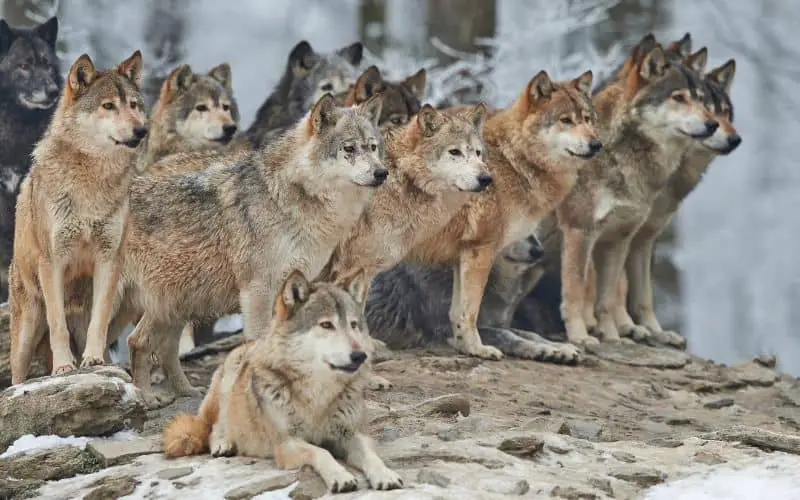
Although they are nothing alike, Cavaliers originally evolved from wolves. Over many years they were cross-bred to become the cute, adorable dogs that live with you today.
You can still see some similarities between Cavaliers and wolves to this day.
- They are pack animals (they like to be in groups)
- They can pick up the scent of other animals.
- They want to hunt (or chase squirrels, anyway)
Some dog breeds howl; yes, even Cavvy’s can howl. Check out this adorable little cutey.
Why Cavaliers Eat Quickly
Back in the days when a cute Cavalier was a scary wolf, they would live, hunt, and eat in packs. The pack had to share everything that was caught and killed.
Having to share their food would cause some squabbling, which could turn into a full-blown fight (we’ve all been a bit ‘hangry’ at times).
Not only would fighting cause injuries, but also one of the others in the pack may steal your food while you are fighting, a lose-lose situation.
So wolves and all wild predators eat very quickly to get their fill before others can steal it or start a fight to get more.
Why Cavaliers Are Greedy
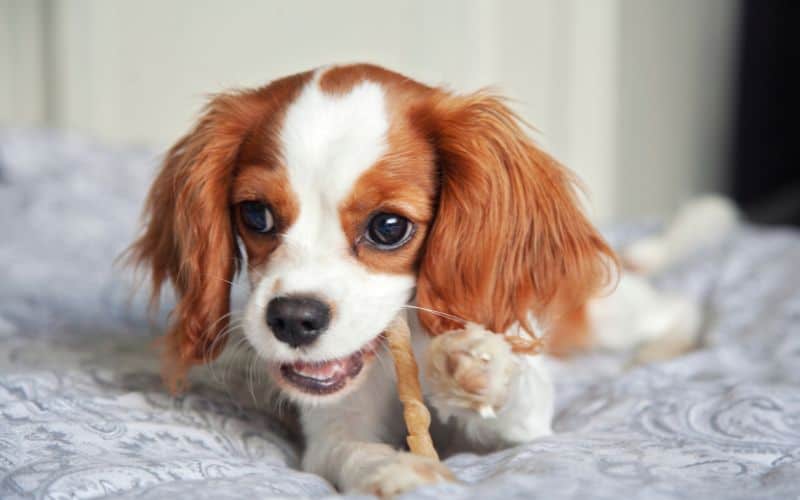
Before wolves were domesticated and bred into the many different breeds of dog that we have today, they had no idea when they would have their next meal.
As a result, it was ingrained in them to eat as much as possible and as fast as possible. For wolves, it was a case of feast or famine.
They would eat enormous amounts of meat in one sitting, as it may be several days until they had their next meal. At this time, they were starving, so they would gobble down as much food as possible.
All these traits still live on within our 4-legged friends, and although we see this as greedy behavior, in their minds, they are just trying to survive.
How Cavaliers Differ from Humans
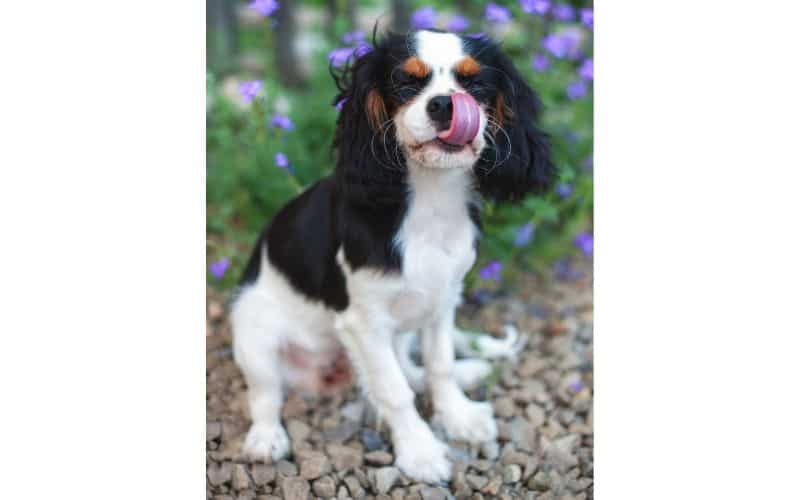
Humans have around 9,000 tastebuds, whereas Cavaliers only have approximately 1,700. They are located at the back of their throats, which may account for the speed at which they consume their food, as they cannot taste food the way we do.
However, dogs still have tastes, such as bitter, sweet, savory, and so on, but their pallet is not as refined as a human’s.
The lack of tastebuds helped their ancestors, as in times of famine, they would need to scavenge from the carcasses of dead animals, which may have been dead for some time. Something that humans are unable to do.
But their lack of tastebuds is made up for by their incredible sense of smell. Cavaliers noses can detect odors 40 times stronger than humans and can smell things we are unaware of.
Consider this when spraying a heavy scent around the home, it may be pleasant to you, but it could be wreaking havoc with your Cavaliers sinuses.
Possible Health Issues
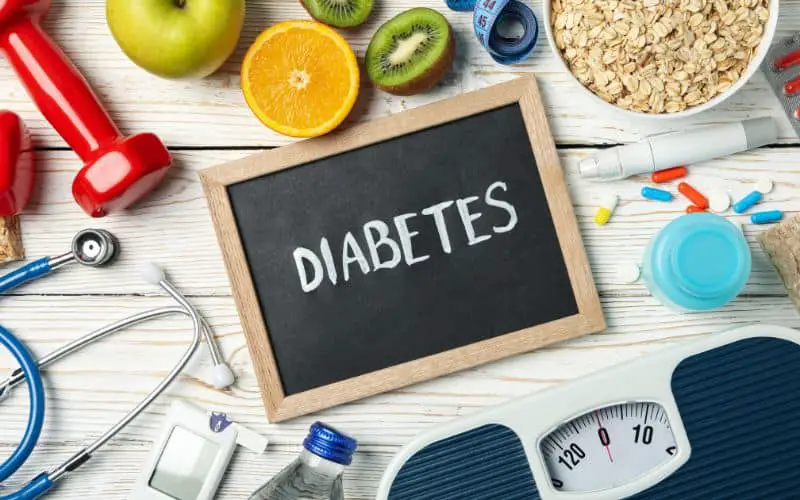
Excessive hunger may only sometimes be attributed to ancestral traits or pure greediness. There may be an underlying health issue that needs to be investigated.
Such diseases could be:
- Cushing’s Disease
- An overactive Thyroid
- Diabetes
We recently discovered that our Cavvy, Lady, had diabetes. She was peeing excessively and drinking copious amounts of water, so we took her to the veterinarian for tests.
We then discovered that she had diabetes, and her hunger increased tenfold. Now we have found the correct insulin dosage for her, the hunger has died down.
Don’t get me wrong, she still acts as if she has never eaten, but she is a lot better now than she was. If you want to read more about our journey with Lady’s diabetes, click this link.
Are Cavalier King Charles Spaniels food motivated?
Yes, many people train their Cavaliers using low-fat, low-calorie treats and lots of positive encouragement, myself included. This gives them the motivation to do whatever you want them to do.
Remember that this is not forever. Once mastered, you need to replace the treat with something else, such as a toy, but continue with positive encouragement.
Why is my Cavalier King Charles always hungry?
Sometimes they may seem as if they are hungry by begging for food, but they are just acting on their instincts to gorge on food when it is available.
However, if the hunger seems more than just begging for scraps, visit your veterinarian, as there may be something else causing the hunger.
How often should Cavaliers eat?
Puppies weaned from their mother should have around 4 small meals a day, as they only have tiny tummies.
When they are around 10 to 12 weeks old, increase the amount of food given, but decrease it to 3 times a day.
Adult Cavaliers should eat once or twice a day.
Are Cavaliers greedy?
Not at all; they are opportunistic, trying to fill their tummies when there is food around.
Cavaliers have not yet adapted to the world they live in now, where food and love is plentiful.
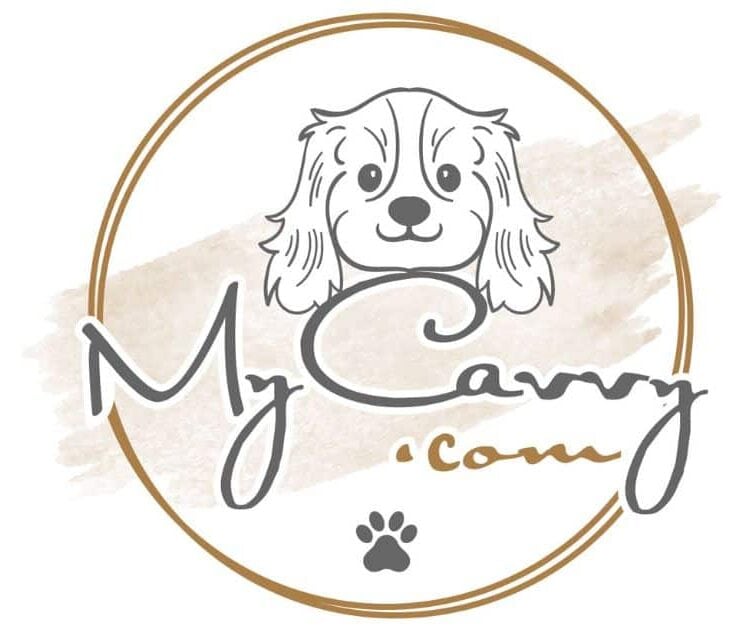
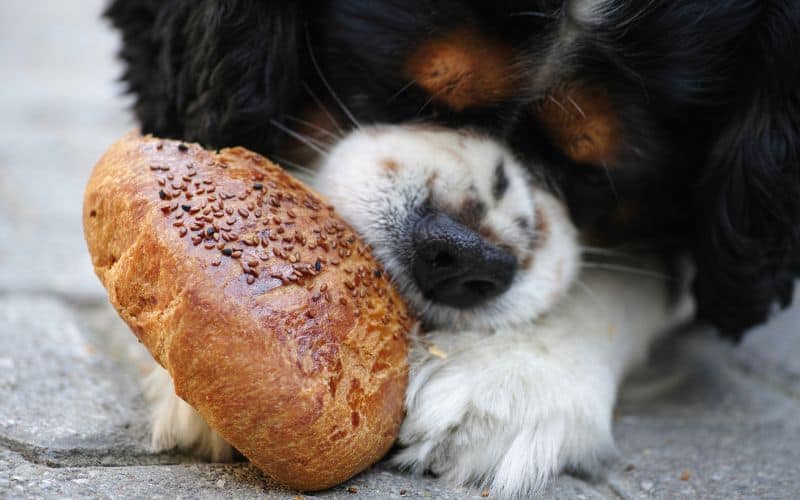
1 thought on “Why are Cavaliers Food Obsessed?”